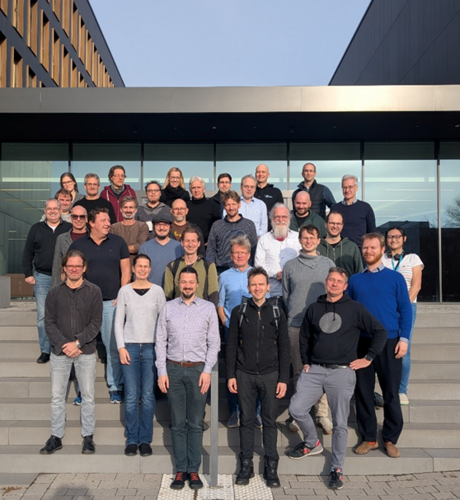2025-11-19 12:23:28
Quote of Carole Cadwalladr @… post, Monday 17th Nov 25, "Peter Thiel gets out of Dodge",
itself quoting...
“The CFO of OpenAI, Sarah Friar, gave the game away a week ago when she said that she was thinking that there was a role for the government to play in backstopping the future investments of companies like OpenAI, that is a terrible idea.[…]
You know, everybody on Wall Street is excited about this #bubble. 34% of the market value is in the big companies. The private ones have notional values that would make them, you know, Fortune 200 companies. ...."
Investors have to take the hit, not taxpayers/public services.
I have seen this film before.
I still don't like the ending.
➡️ #Edinburgh
Edited to add tag
2025-12-19 16:57:17
Brian Schottenheimer gets honest about reason for moving Matt Eberflus to booth https://www.si.com/nfl/cowboys/onsi/news/brian-schottenheimer-honest-reason-moving-matt-eberflus-to-booth
2026-01-08 18:21:23
Have you downloaded Signal and Proton Mail yet? Now is the time.
Signal and Proton Mail won’t go away, but they might be removed from the Apple and Google stores putting them out of reach for most users. Remember ICEBlock? It can happen. Download Signal and Proton Mail today and ask your friends to do the same. Free installation and configuration guides here:
htt…
2025-12-05 19:17:40
2025-11-27 22:24:51
28 Systems architects from all #NFDI consortia, two highly productive days at @… in #Göttingen, one shared goal: To make all NFDI services interoperable by an overall archite…
2025-10-30 10:05:59
The fracturing of the Dutch far-right, after Wilder's reminded everyone that bigots are bad at compromise, is definitely a relief. Dutch folks I've talked to definitely see D66 as progressive, <strike>so there's no question this is a hard turn to the left (even if it's not a total flip to the far-left)</strike> a lot of folks don't agree. I'm going to let the comments speak rather than editorialize myself..
While this is a useful example of how a democracy can be far more resilient to fascism than the US, that is, perhaps, not the most interesting thing about Dutch politics. The most interesting thing is something Dutch folks take for granted and never think of as such: there are two "governments."
The election was for the Tweede Kamer. This is a house of representatives. The Dutch use proportional representation, so people can (more or less) vote for the parties they actually want. Parties <strike>rarely</strike> never actually get a ruling majority, so they have to form coalition governments. This forces compromise, which is something Wilders was extremely bad at. He was actually responsible for collapsing the coalition his party put together, which triggered this election... and a massive loss of seats for his party.
Dutch folks do still vote strategically, since a larger party has an easier time building the governing coalition and the PM tends to come from the largest party. This will likely be D66, which is really good for the EU. D66 has a pretty radical plan to solve the housing crisis, and it will be really interesting to see if they can pull it off. But that's not the government I want to talk about right now.
In the Netherlands, failure to control water can destroy entire towns. A good chunk of the country is below sea level. Both floods and land reclamation have been critical parts of Dutch history. So in the 1200's or so, the Dutch realized that some things are too important to mix with normal politics.
You see, if there's an incompetent government that isn't able to actually *do* anything (see Dick Schoof and the PVV/VVD/NSC/BBB coalition) you don't want your dikes to collapse and poulders to flood. So the Dutch created a parallel "government" that exists only to manage water: waterschap or heemraadschap (roughly "Water Board" in English). These are regional bureaucracies that exist only to manage water. They exist completely outside the thing we usually talk about as a "government" but they have some of the same properties as a government. They can, for example, levy taxes. The central government contributes funds to them, but lacks authority over them. Water boards are democratically elected and can operate more-or-less independent of the central government.
Controlling water is a common problem, so water boards were created to fulfill the role of commons management. Meanwhile, so many other things in politics run into the very same "Tragedy of the Commons" problems. The right wing solution to commons management is to let corporations ruin everything. The left-state solution is to move everything into the government so it can be undermined and destroyed by the right. The Dutch solution to this specific problem has been to move commons management out of the domain of the central government into something else.
And when I say "government" here, I'm speaking more to the liberal definition of the term than to an anarchist definition. A democratically controlled authority that facilitates resource management lacks the capacity for coercive violence that anarchists define as "government." (Though I assume they might leverage police or something if folks refuse to pay their taxes, but I can't imagine anyone choosing not to.)
As the US federal government destroys the social fabric of the US, as Trump guts programs critical to people's survival, it might be worth thinking about this model. These authorities weren't created by any central authority, they evolved from the people. Nothing stops Americans from building similar institutions that are both democratic and outside of the authority of a government that could choose to defund and abolish them... nothing but the realization that yes, you actually can.
#USPol #NLPol
2025-10-26 00:30:00
Moody Urbanity - Metro Consistency 📌
情绪化城市 - 都市质地 📌
📷 Pentax MX
🎞️ Orwo Wolfen P400
#filmphotography #Photography #blackandwhite
2025-10-30 16:37:28
Dear IT Friends – We Are Called To Action
If you are like me, you have probably experienced your neighbors, friends and family asking you to help them fix their PCs and give them technical advice. That was always a bit odd for me as I was a big systems guy and relied on our internal IT team for PC advice and support.
But the times are changing, aren’t they?
It feels like we are facing so much new danger. And some groups are definitely targets. In my company our success was…
2025-12-04 07:25:52
Didn't feel like thinking too much for today's problem of #AdventOfCode, so my solution is quite naive and runs in a few tens of milliseconds for part 2 (thanks, #RustLang!).
I went for a HashSet for the grid just because it made looking up neighbours simpler at the edges, probably also not the most performant solution, but gets better as the grid becomes sparser.
#AoC #AoC2025 #AdventOfCode2025 #rust





